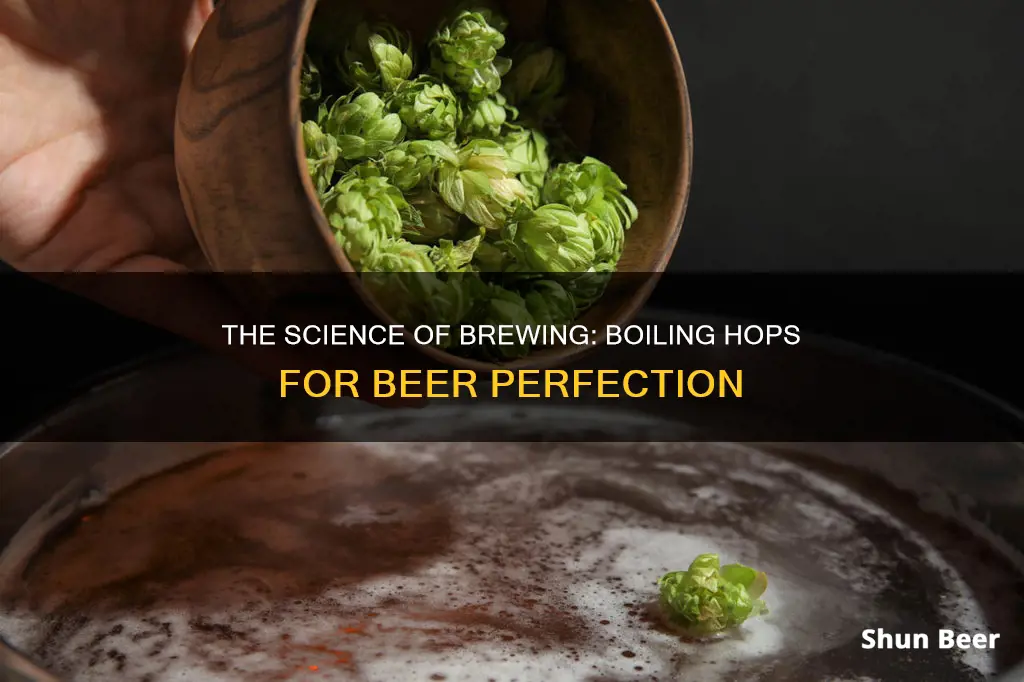
Hops are an essential ingredient in beer, alongside barley, yeast, and water. They are added to the boil stage of brewing beer, as it takes a long time to unleash the alpha acids that bitter and balance the sweetness of the malt. The longer the hops are boiled, the more bitterness is extracted from them, and the less flavor and aroma are retained. Conversely, boiling hops for a shorter period of time results in less bitterness and more flavor and aroma. Therefore, the timing of hop additions plays a crucial role in determining the final flavor profile of the beer.
| Characteristics | Values |
|---|---|
| Purpose of boiling hops | To add bitterness, flavour, and aroma to the beer |
| Effect of boiling time on bitterness | The more hops are boiled, the more bitter the beer becomes |
| Effect of boiling time on flavour and aroma | The less hops are boiled, the more flavour and aroma are preserved |
| Other benefits of boiling hops | Sterilises the wort, denatures enzymes from the mash, and stabilises proteins |
What You'll Learn

Boiling hops adds bitterness to beer
The hops plant, or Humulus lupulus, is a key ingredient in beer, alongside barley, yeast, and water. Hops are the cone-shaped flowers of the female hops plant and are added to the boil stage of brewing beer.
Bitterness
The hops plant contains alpha acids, which are insoluble in wort and are not bitter. However, when alpha acids are heated in a solution, they undergo a process called isomerization, which converts them into iso-alpha acids. Iso-alpha acids are soluble in wort and impart a bitter taste. The longer hops are boiled, the more iso-alpha acids are produced, and the bitterer the beer will be.
Timing
The timing of hop additions during the boil is crucial to achieving the desired level of bitterness. Generally, hops added at the beginning of the boil mainly contribute bitterness, while hops added towards the end of the boil add more flavour and aroma. This is because the bittering potential of hops is realised more quickly than their flavour and aroma potential. In a typical one-hour boil, hops added 30 to 60 minutes before the end will mostly add bitterness, hops added 15 to 30 minutes before the end will add flavour, and hops added in the final 15 minutes will add aroma.
Measurement
The bitterness of a beer can be measured using International Bittering Units (IBU), which quantifies the iso-alpha acids in the beer. However, the desired level of bitterness is ultimately a matter of personal preference, and the amount of hops added during boiling can be adjusted accordingly.
The Magic of Hops in Beer: Aroma, Flavor, and More
You may want to see also

The longer hops are boiled, the more bitter the beer
Hops are added to beer to create bitterness and overall flavour. They are flowers of the plant Humulus lupulus, which is a cousin of the cannabis plant. Hops contain alpha and beta acids, which, when boiled, create soluble bittering agents that become part of the brew. The longer the hops are boiled, the more bittering qualities are released and absorbed into the wort.
The amount of bitterness in beer depends on how many hops are added to the kettle and how long they are boiled. The more hops that go in early in the boil, the more bitter the beer will be. The longer hops are boiled, the more their bittering qualities are released and absorbed. Conversely, the more hops that go in towards the end of the boil, the more hoppy the beer will seem in aroma and flavour, but not necessarily in bitterness.
The bitterness of a beer is measured with International Bittering Units (IBU). The higher the IBU, the more bitter the beer. The IBU will often be indicated on craft ale but not usually on mainstream beers.
The flavour of the beer comes from the unique blend of oils present in each unique variety of hops. Extra hops can be added after the boiling process to flavour the beer without adding bitterness.
In summary, the longer hops are boiled, the more bittering qualities are released and absorbed, making the beer more bitter.
Brewing Beer in Rimworld: Hops to Alcohol
You may want to see also

Boiling hops also adds flavour and aroma
Hops are an essential ingredient in beer, adding bitterness, flavour, and stability to the finished product. The boiling process is important as it yields hops' full complement of bitterness, flavour, and aroma. The longer the hops are boiled, the more bitter they become, and the less flavour and aroma they impart.
The hops' oils add a bittering quality to the beer, which is important to balance the sweetness of the malt. Without hops, most beers would be cloyingly sweet and virtually undrinkable. The hops' oils also contribute a preservative quality to the beer.
The timing of when the hops are added during the boil will determine how much flavour and aroma the beer will have. The conventional wisdom is that hops added at the start of the boil are "bittering hops", hops added about 30 minutes before the end are "flavour hops", and hops added in the final 10 minutes or less are "aroma hops". However, this is not a productive or accurate way to think about it, as all hops contribute to bitterness, flavour, and aroma to some degree. Brewers manipulate the relative contributions of these qualities by adjusting the timing of the hops additions.
The hops' flavour profile can be further influenced by the type of hops used. For example, Northern Brewer hops have a flavour profile that is easily identifiable in a finished beer. Other hops with distinct flavour profiles include Simcoe, Mosaic, Citra, Amarillo, Mt Hood, Nugget, and Willamette.
Dark Beer's Hoppy Character: Choosing the Right Hops
You may want to see also

Hops act as a preservative
Hops are an essential ingredient in beer, alongside barley, yeast, and water. They contain acids and oils that impart bitterness, flavor, and stability to the finished beer. The hops plant, or Humulus lupulus, is a cousin of the cannabis plant.
Secondly, hops contribute to the bitterness of the beer, which is essential for balancing the sweetness of the malt. Without hops, beers would be cloyingly sweet and virtually undrinkable. The bittering quality of hops acts as a natural preservative by inhibiting the growth of certain microorganisms that prefer sugary environments.
Additionally, hops contribute to the flavor and aroma of the beer. While this doesn't directly contribute to preservation, it can enhance the overall stability and shelf life of the beer by improving its sensory qualities and masking any off-flavors that may develop over time.
The timing of hop additions during the boiling process is crucial. The longer hops are boiled, the more bitterness they impart, and the shorter they are boiled, the more flavor and aroma they contribute. This is because the heat breaks down the delicate aspects of hops, such as color and flavor, while releasing their bittering qualities. Therefore, hops added towards the end of the boil will contribute more to the aroma and flavor of the beer, while hops added earlier will provide more bitterness.
In summary, hops act as a preservative in beer by inhibiting the growth of unwanted microorganisms, balancing the sweetness of the malt, and contributing to the overall flavor and aroma profile, which can mask off-flavors. The boiling process and timing of hop additions are critical to maximizing these preservative effects.
Hoppy Beer: When to Add Hops for the Best Flavor
You may want to see also

Boiling hops sterilises the wort
The boiling process is a crucial step in the creation of beer, and it influences the final flavour, bitterness and purity of the beverage. Boiling hops is essential as it sterilises the wort, killing potentially harmful microorganisms and preventing unwanted fermentation and infections that could negatively impact the flavour of the beer.
The boil also helps to remove or reduce undesirable flavourings and compounds in the wort, such as dimethyl sulphide (DMS), which can cause an unpleasant flavour in cooked vegetables. An open boil, without a lid, is required to drive out the DMS with the steam.
The boil further serves to sterilise the wort, making it a suitable growth medium for the yeast culture to come. The heat generated during the boiling process kills bacteria and yeasts, and inactivates enzymes utilised in the mash. This sterilisation is vital to ensure the wort is free from bacterial contamination, as the pathogenic and spore-forming organisms that can survive are precluded. The low pH and the antibacterial action of certain hop constituents also ensure that the wort is sterilised.
The boiling process is a critical step in the beer-making journey, and it plays a significant role in ensuring the desired flavour, bitterness, and purity of the final product.
Hops-Centric Beers: High Hop Brews to Try
You may want to see also
Frequently asked questions
Boiling hops yields their full complement of bitterness, flavour, and aroma. The longer the hops are boiled, the more bitter the beer will be.
Hops added 30 to 60 minutes before the end of the boil mainly contribute bitterness. Hops added 15 to 30 minutes before the end tend to add flavour. Hops added in the final 15 minutes offer mostly aroma.
The boil is the fourth essential step in brewing beer. It sterilises the wort, denatures enzymes, and stabilises proteins. It also removes harmful proteins that can cause off-flavours and instability.
There are boil additions, flavour additions, finishing additions, steeped or







